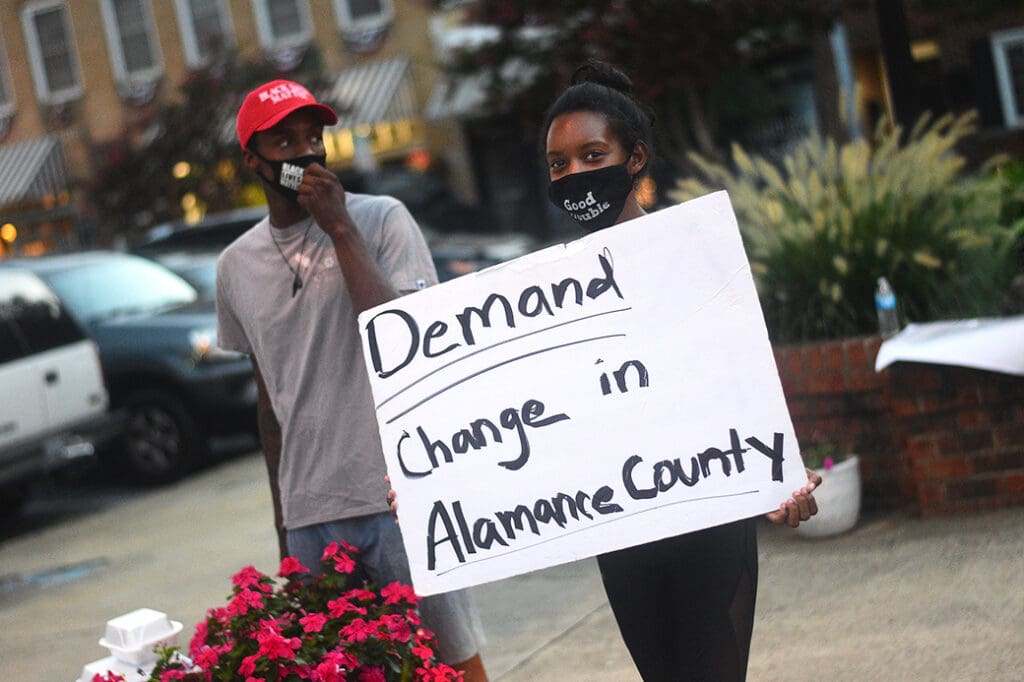After 10 years of living peaceably in Alamance County, an overwhelmingly white-majority rural county in North Carolina between Raleigh and Greensboro, Bonnie Dobson had a serious dilemma. Should she support the anti-racism candidates she’s been working to elect by putting their signs in her front yard or not?
“I rarely put my views out there for fear of retaliation against my children,” says Dobson, an African-American mother of three in her 50s. “There’s people I associate with and talk to and may even socialize with, but they don’t know how I feel about social issues. I don’t talk about it because it’s not welcome.”
Others in the community are not as taciturn. Recent public expressions of foul language against protesters of a Confederate statue in Graham, the county seat, add to her fears that Trump’s let the racism all the way out of the bag, and it isn’t going back anytime soon. Two men were arrested for attacking two peaceful demonstrators at a protest in July.
“Personally, I’m scared,” she says, referring to the election results. “They’re flying Confederate flags, calling you ugly things. They’re very comfortable with that now; either way it’s not going to go well.”

Terror of scarcity in a rural economy that’s never recovered from the 2008 recession has been accompanied by a surge of white supremacist organizing by Alamance County Taking Back Alamance County (ACTBAC), a so-called Southern heritage group. A countervailing progressive force might have pointed to more rational bases for the county’s economic deterioration such as the legislature’s tax cuts for the wealthy and big corporations foisted on the state by its Republican super-majority. They opted for the “trickle down” approach rather than pursuing Medicaid expansion, a living wage and investment in broadband and transportation options to connect rural workers to jobs. Instead, race-based anti-immigrant scapegoating helped Trump overwhelm Hillary Clinton 54.5% to 41.9%. Some members of ACTBAC went to the 2017 “Unite the Right” rally in Charlottesville, Virginia, where Heather Heyer was run down by an adherent of Hitler’s Final Solution. Her murder deemed a federal hate crime, a sentence of life plus 419 years was imposed on Heyer’s killer. But the rhetoric hangs in the air and gun sales in the state are off the charts – despite a shortage of ammunition.
Gun sales are skyrocketing in North Carolina, despite a shortage of ammunition.
Alamance County’s population of 169,509 is dispersed over 424 square miles; a quarter of its residents lack broadband connectivity. Whites comprise 73.6 percent, Blacks 20.9 percent, Hispanics or Latinos 13.1 percent. It was once home to 54 hosiery manufacturers and 30 textile mills, workplaces that provided secure jobs. But under globalization the entire industry migrated abroad in the 1990s, and mills up and down the Haw River that had sustained the economy since the mid-19th century were abandoned, their hulks standing as memorials to a prosperity no longer in reach.
A defunct furniture plant in downtown Mebane has been repurposed into high end apartments with studios starting at $875 a month, and on the other side of the train tracks, an old mill has been turned into subsidized lofts for families of four with a maximum income of $33,660. Together they mark the growing inequality as the county moves toward becoming a bedroom community for commuters to the Research Triangle and Piedmont Triad, priced out of their own communities and trading cheaper housing for a 45-minute drive each way.
In a county where the largest cash crops include soybeans, tobacco and corn, independent small farmers are burdened by depressed commodity prices and the “extreme uncertainty and instability in agricultural markets caused by Trump’s approach to trade,” says Zoe Willingham, research associate for economic policy at the Center for American Progress and co-author of: The Path to Rural Resilience in America, a rural investment white paper. The average age of Alamance farmers is just over 58 years old. Willingham worries about what will happen to their approximately 80,000 acres as the current crop of landowners ages out: Will they be transferred to a new generation of farming families, or to Big Ag?
Over the past decade, wages have fallen in 44 of North Carolina’s 100 counties, including Alamance.
Alexandra Sirota is the director of the Budget & Tax Center at the North Carolina Justice Center, a think tank in Raleigh committed to ending poverty. She reports that rural poverty rates are on the rise, young people are leaving for the cities, and wages have fallen in 44 of North Carolina’s 100 counties, including Alamance, since 2009.
“Coming out of the 2008 recession, there were a bunch of mini chances to make progress, and at every moment we took the wrong turn,” she says. “The state continues to underspend year after year despite growing needs and growing population statewide.”
* * *
Dobson’s family lives in a rambling old farmhouse on four acres not far from her aging parents. Lately because of COVID, she’s been taking “getaway” walks on a nearby trail, going in the early mornings because it’s empty at that time and distancing is not an issue. “Sometimes I’ll listen to a Brené Brown podcast, or just walk in the silence or birdsong; there’s magnolia trees and ornamental grasses that sway with the breeze, and around this one little area, a manmade pond with turtles,” she says. “It’s flat all the way.” Their home life, she says, has been “lovely,” and they’ve focused on scholastics and soccer and growing their daughters into accomplished young women. But it’s come at a price she can no longer afford to pay: her silence. Silence about the effort required not to internalize the many indignities that come her way on any given day. Some, she says, are small irritations, like the placement of Black hair care products on the tallest, hardest to reach shelf in the back of the Walmart. Others are more wounding, like conversations peppered with casual racist slurs gussied up as clueless compliments: “You’re awfully smart for a colored gal.”
But her silence has become corrosive to her soul, and it’s cracking wide open.
“When George Floyd was murdered, it completely rocked my world,” she says. “I’m beginning to find my voice. At my age, it’s time.”
Deep canvassing is a method of compassionate listening in which participants discuss issues where the personal meets the political.
Last fall Dobson came home from picking up one of her kids at school to find a car in the driveway. Sugelema “Shug” Lynch from Down Home North Carolina had stopped by to engage her in a “deep canvassing” session, which is a method of compassionate listening and empathy in which participants exchange and reflect on issues where the personal meets the political, like access to health care. It’s a technique that seemed intuitive to Brigid Flaherty, the organization’s co-director who, disturbed by the 2016 election results, moved to North Carolina, where her mom lives, to see if she could help open up the conversation about race. Along with George Goehl, the director of People’s Action, a national organization devoted to progressive policy advocacy for rural America, they co-founded Down Home North Carolina in 2017. It has established chapters in five rural North Carolina counties.
Deep canvasses are half-hour conversations with voters that are helping Down Home NC build a coalition of Black, brown and white folks in order to amass electoral power for working families. They can be revelatory. In point of fact, Dobson says her talk with Lynch has changed the course of her life.
“Shug and I shared stories about our experiences with health care and our views on immigration. Then she left, but she’d made an impression on me,” she says. Dobson is now a lead canvasser for Down Home NC and loves the work.

Due to COVID, canvassers now make contact by phone, instead of via face to face visits. A recent study shows that long personal conversations held in advance of elections are about 102 times more effective at changing minds than the usual Get Out the Vote method, typically a brief one-way communication when dropping off campaign literature in the days before the vote. The race for president in North Carolina is too close to call, with Trump currently trailing Biden by one to four percentage points in all seven polls tracked by CNN, a sea change from 2016.
Gayle Schwartzberg, the group’s political director, says her organization doesn’t have to tell residents in Alamance that the current economy isn’t working for them.
“Folks in rural communities are living it. Jobs are dwindling, they’re having a really hard time making ends meet, there are months where they don’t know if they can make the rent.” And that was before the pandemic.
With her colleague Mia Ives-Rublee and others, they developed a Relational Voter Turnout (RVT) program in which people activate their own social networks to make sure everyone votes, bridging the chasm between registered and actual voter.
“People contacted by people they know are four times more likely to agree to vote than if they’re contacted by a stranger,” Ives-Rublee explains. “In deep canvassing we talk about issues in a way that’s respectful of the communities, and understanding of the ways people interact in those communities.”
“In deep canvassing we talk about issues in a way that’s respectful of the communities, and understanding of the ways people interact in those communities.”
~ Mia Ives-Rublee, Field Director at Down Home NC
One of the issues most on the minds of those canvassed last year were raids conducted by ICE in February 2019 throughout North Carolina, in which 230 people were arrested. Ian Baltutis, mayor of Burlington in Alamance County, signed on to a statement with six other mayors condemning the actions “which have struck terror in the hearts of many of our valued community members.” In addition to wanting the raids and family separations to stop, those canvassed cared about financial dignity and police accountability, insights that informed the group’s endorsements of five candidates, including two important firsts. If Dreama Caldwell is elected as Alamance County commissioner, she’ll be the first African-American woman to be sworn in. Born in the county, her road has been long and rugged; her abolitionist stance on cash bail is personal and has been recounted in a passionate song by banjo player and songwriter Joe Troop called “The Rise of Dreama Caldwell.”
If Ricky Hurtado wins his race, he’ll be the first Latinx person to serve in the state’s General Assembly. But none of that matters, he says, if the Democrats don’t succeed in capturing one of the chambers and breaking the super-majority before the 2021 redistricting.
“That will impact us not just for the next two years, but for the next 10 years. It’s a national issue, too. If we can get fair representation in North Carolina, which is very much a purple state, then we’ll get better, fairer representation in Congress.”
Ives-Rublee says that it’s Down Home’s strategy to bring people along in an arc – first issues, then candidates, followed by the importance of electing these particular people.
“In our state, that requires us to stay nimble. We’re asking people to mail in their ballots and vote as safely as possible,’ she explains. “At the same time we’re trying to keep our ear to the ground if there are issues or delays with the USPS, and be prepared with contingency plans. Getting out the vote in rural locations is extremely complex.”
Schwartzberg acknowledges that the country is in new territory, and doesn’t expect that we’ll have the results on November 3.
“We understand there is going to be civil unrest,” she says. “What we’re really preparing ourselves to do is to have a network of people who are trained in activism and who trust one another. This is not a moment that has struck our communities this summer. Four years ago a lot of promises were made to rural folks about fixing the economy, and we have not seen any of those changes.”
As scary as it can get in Alamance County, where the sheriff refuses to wear a mask to prevent COVID transmission and his own jail is full of virus, making arrest for participating in protests a terrifying prospect, Bonnie Dobson remains committed.
“There are some really good people here that just need their eyes to be opened,” she says. “The man who told me ‘I was smart for a colored gal’ is in his early 80s. I put myself where he was, and I got it that it wasn’t the time to educate him, that it was the time to say ‘thank you.’ Later I’ll help him understand how I look at things.”
Copyright 2020 Capital & Main





